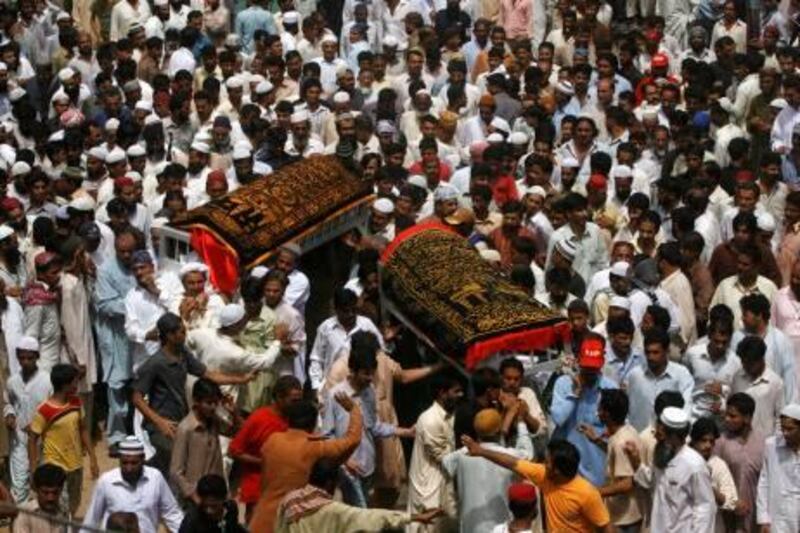KARACHI // Rahmanuddin stands on one of the steep dirt lanes that weave through Pahar Gunj, a Pashtun slum in north Karachi, and describes his brother's murder.
"Around midnight on October 4, he picked up a passenger in his taxi who told him to go to Liaqatabad," he said. "When he stopped to drop the man off, two men were waiting and they shot him. Twice in his arms and once in the chest. He was just a working man. He was with no political party. They killed him because he was Pashtun." Ethnic violence in the city of 18 million has left more people dead this year - more than 1,300, according to the Human Rights Commission of Pakistan - than all terrorist attacks across the country combined.
The exact causes of the violence, and why it has risen so sharply, are difficult to identify: suspects are rarely prosecuted and the city's politics is filled by a volatile, murky brew of overlapping ethnic, criminal and militant sectarian groups.
"Crime and politics have gotten juxtaposed, and it's very difficult to disentangle where one ends and the other begins," said Talat Aslam, the editor of The News, Pakistan's largest English-language daily.
Close observers of the city's politics agree, however, that the central actors in the bloodshed are competing ethnic political parties and the criminal gangs linked to them. At the heart of the conflict, they say, is a fight for control of the hugely lucrative tracts of public land that are being illegally developed, both for profits and to cement control of turf and political power.
Underlying this bloody competition is a huge demographic shift.
The killings began after the 2008 elections, according to police records, when the ethnic Pasthun Awami National Party, or ANP, for the first time won seats in the Sindh assembly. Before this, the Pashtun vote was divided among a number of parties.
"The Pashtuns have woken up to their own strength and how they can influence policy," Mr Aslam said.
Their size has expanded rapidly in the past few years as military operations in the north have displaced millions. There are an estimated five million Pashtuns living in Karachi and they have become increasingly frustrated at their continuing marginalisation in government. Only two out of the 42 available seats for Karachi in the Sindh assembly are held by the ANP, despite Pashtuns constituting nearly a quarter of the city's population.
Mostly middle-class Muhajirs, the descendants of north Indians who fled to Pakistan during Partition after 1947, make up about half of Karachi's population. The Muttahaida Quami Movement party, or MQM, claims to represent their interests and has had an iron grip on the city's politics for the past decade.
It blames the surge in murders on a variety of gangs as well as Taliban militants it says are being given cover in Pashtun neighbourhoods by the ANP, which claims to be the political voice of the city's rapidly growing Pashtun population.
ANP leaders deny the accusations and say the MQM seeks to equate all Pashtuns with the Taliban in order to justify violence against them.
Whoever the culprits, the result has been tit-for-tat killings that sometimes target party activists, but much of the time average Karachiites such as Rahmanuddin's brother are murdered simply on the basis of their ethnicity.
The police can do little to stop the violence because of political pressure, complicity in the land grabbing and a basic lack of resources. A senior police official, who requested anonymity, said that even when suspects were arrested, a lack of forensic techniques and equipment meant that almost all were eventually released.
The historical absence of government planning had directly caused the city's politics to form around ethnicity and violence, said Haris Gazdar, a director with the Karachi-based Collective for Social Science Research.
"The provision of essential goods and services - housing, utilities, transport - occurred in the informal sector", by groups that coalesced around ethnic solidarity, and who used violence to enforce the functioning of these basic services, Mr Gazdar said.
"Once violent ethnic politics made a successful entry into the city, virtually all organisations and ethnic groups understood that this was one of the dominant ways of doing politics in the city."
Many families have been pushed out of once ethnically-mixed neighbourhoods as the parties have sought to consolidate their electoral power. Abutting Pashtun and Muhajir neighbourhoods areas have become flash-points of violence, and there is a growing perception of fear among average people.
"In areas where Pashtuns take over, like Qasba Colony, Muhajirs are pushed out or they have to pay a 'tax' to the ANP, and the reverse is true," said Mohammed Shamsuddin, a community activist in Orangi Town, a Muhajir-majority neighbourhood with a growing Pashtun population. "This has created a divide in peoples' mindsets and ethnicisation has become entrenched."
foreign.desk@thenational.ae
Ethnic violence rules Karachi politics
At the heart of Karachi's ethnic conflict is control of the lucrative tracts of public land being developed illegally.

Editor's picks
More from the national




